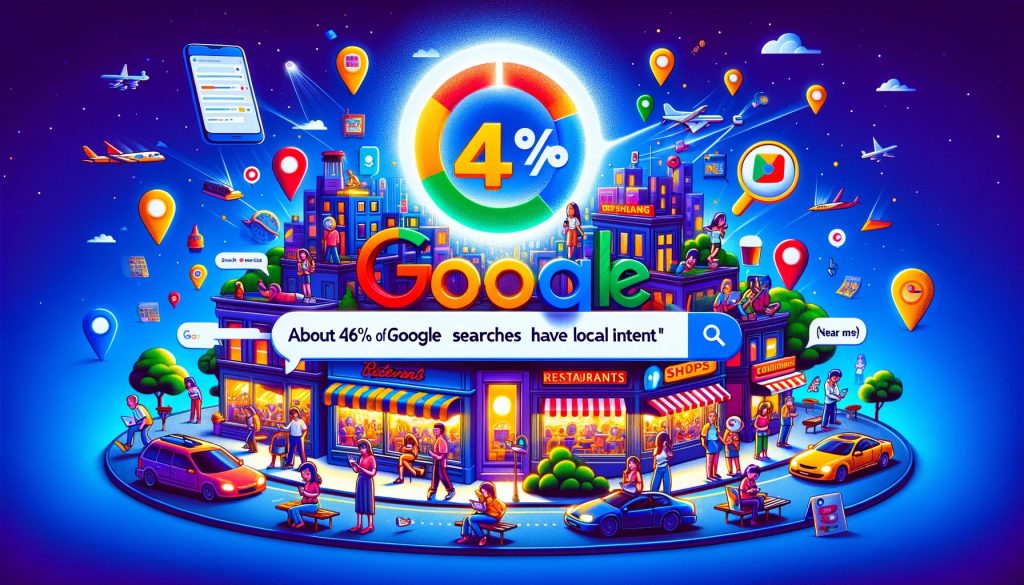
In the dynamic realm of digital marketing, the evolution of search engine algorithms has significantly altered the way businesses strategize their online presence. One crucial aspect that has gained immense importance in recent years is local intent in Google searches. Understanding and capitalizing on this phenomenon can be a game-changer for businesses aiming to enhance their visibility and reach a targeted audience.
Brief Overview of the Significance of Local Intent in Google Searches
The concept of local intent refers to search queries conducted by users with specific geographical or location-based requirements. These queries typically include terms like “near me,” “in [city],” or “closest to.” The significance of local intent lies in its ability to connect users with relevant information, services, or products available in their vicinity. For businesses, appearing in search results with high local intent can drive foot traffic, boost sales, and foster customer loyalty.
Introduction to the Statistic that 46% of Google Searches Have Local Intent
A staggering statistic that underscores the prevalence and impact of local intent in Google searches is the revelation that approximately 46% of all searches on this ubiquitous search engine possess a localized focus. This statistic highlights the substantial portion of online users who are actively seeking nearby solutions for their needs. Acknowledging this statistic is paramount for businesses looking to tailor their digital marketing strategies towards capturing this sizable segment of potential customers.
Understanding Local Intent in Google Searches

Definition of Local Intent in Search Queries
Local intent in Google searches refers to the specific intention of users to find information, products, or services within a geographically defined area. When users include location-based terms or phrases in their search queries, they are indicating their desire for results that are relevant to their current physical proximity or a designated location.
This can range from searching for nearby businesses, events, attractions, or services to seeking localized information such as weather updates, traffic conditions, and community news. Understanding local intent is crucial for businesses looking to connect with potential customers in their target geographic areas.
Examples of Search Queries with Local Intent
Search queries with local intent often include terms like “near me,” “[product/service] in [city],” or specific location names. For instance, someone searching for “restaurants near me” is expressing a clear interest in finding dining options within a close radius of their current location. Similarly, individuals seeking services like plumbing assistance may use queries such as “plumbers in [city]” to locate professionals operating in a particular geographical area.
By incorporating these localized keywords and phrases into search queries, users signal their preference for relevant results that cater to their immediate needs and preferences. This alignment between user intent and search results underscores the importance of local SEO strategies for businesses aiming to capture local market segments effectively.
In this section, we delved into the intricate nuances of local intent within Google searches by defining its essence and illustrating its manifestation through various examples. These insights serve as foundational knowledge for businesses looking to optimize their online presence for local audiences and stand out amidst the competitive digital landscape shaped by evolving consumer behaviors and preferences.
Factors Influencing Local Intent Searches

Impact of Mobile Usage on Local Intent Searches
The exponential rise in mobile device usage has significantly impacted the way users conduct searches, especially when it comes to local intent. With the convenience of smartphones, users are constantly seeking instant solutions to their queries while on the move. This behavior has led to a surge in location-specific searches as individuals look for products, services, or information closest to their current position.
Google’s algorithm recognizes this trend and prioritizes search results that are geographically relevant, making mobile optimization crucial for businesses targeting local audiences. The responsive design of websites and the integration of mobile-friendly features play a pivotal role in ensuring a seamless user experience and increasing visibility in local search results.
Influence of Location-Based Services and Technologies like GPS
The integration of location-based services and technologies like GPS has revolutionized how businesses connect with consumers based on their geographical proximity. By leveraging these tools, marketers can precisely target their audience with localized content tailored to specific regions or neighborhoods. Location-based services enable businesses to deliver targeted advertisements, promotions, or offers based on the user’s real-time location data.
Moreover, advancements in GPS technology have made it easier for users to receive accurate directions to nearby businesses or points of interest through mapping applications. As a result, incorporating location-based strategies into marketing campaigns not only enhances customer engagement but also improves overall visibility in local search results by aligning with user preferences and behavior patterns.
Importance for Businesses and Marketers

Benefits of ranking well for local searches on Google
In today’s digital age, where consumers are increasingly turning to search engines like Google to find products and services near them, ranking well for local searches is paramount for businesses. High visibility in local search results can significantly boost foot traffic to physical stores, increase website traffic, and ultimately drive sales.
By appearing at the top of local search results, businesses can establish credibility and trust with potential customers who are actively seeking their offerings within a specific geographic area. Furthermore, dominating local search results can help businesses outshine competitors and solidify their presence in the local market.
Strategies for optimizing content for local intent searches
To optimize content effectively for local intent searches on Google, businesses and marketers need to employ a strategic approach that focuses on key elements such as location targeting, keyword optimization, and online reviews. Implementing geo-targeted keywords throughout website content, meta tags, and business listings can enhance visibility in relevant local searches. Creating location-specific landing pages that provide detailed information about products or services offered in specific areas can also improve relevance and rankability.
Additionally, actively managing online reviews on platforms like Google My Business can boost credibility and trustworthiness among potential customers searching locally. Integrating these strategies into a comprehensive local SEO plan can help businesses maximize their online visibility and attract qualified leads from nearby locations.
Success Stories of Businesses Leveraging Local SEO Strategies
The success stories of businesses that have effectively leveraged local SEO strategies serve as inspiring examples for others to follow suit. One such notable case is a family-owned restaurant in a bustling city that saw a significant increase in foot traffic and online orders after implementing targeted local SEO tactics.
By optimizing their website content with relevant keywords, claiming and updating their Google My Business profile, and actively seeking positive reviews from satisfied customers, the restaurant not only improved its visibility in local search results but also built a loyal customer base. This success story exemplifies the tangible benefits that come from prioritizing local intent in digital marketing efforts.
Real-World Examples Showcasing the Impact of Catering to Local Intent
In the competitive landscape of modern business, real-world examples showcasing the impact of catering to local intent underscore the importance of aligning marketing strategies with consumer behavior. Consider a boutique clothing store located in a quaint neighborhood that struggled to attract customers beyond its immediate vicinity.
By implementing geotargeted ads on social media platforms, creating location-specific landing pages on their website, and partnering with local influencers for promotional campaigns, the store witnessed a remarkable surge in foot traffic and online sales. This real-world example demonstrates how adapting to local intent not only drives business growth but also fosters community engagement and brand loyalty.
Tools for Local SEO Optimization
One of the most critical aspects of successful local SEO optimization is utilizing the right tools. Marketers have a plethora of resources at their disposal to enhance their presence in local search results.
Tools like Google My Business, Moz Local, BrightLocal, and Yext are widely used for managing business listings, monitoring online reviews, and tracking local search performance metrics. These tools provide valuable insights into how well a business is performing in local searches and offer suggestions on areas for improvement.
Enhance Your Presence with Popular Tools
Google My Business is a free tool that allows businesses to manage their online presence across Google Search and Maps. By claiming and optimizing your Google My Business listing with accurate information about your business, such as address, phone number, hours of operation, and photos, you can increase your visibility in local search results. Moz Local is another essential tool that helps businesses manage their online listings across various platforms while providing data on how accurate and consistent the information is across the web.
Resources for Local SEO Optimization
In addition to utilizing tools for local SEO optimization, marketers can benefit from various resources such as blogs, forums, and courses that focus on improving rankings in locally targeted searches. These resources offer valuable insights, tips, and best practices for implementing effective local SEO strategies to attract more customers from nearby locations.
Leverage Blogs & Forums for Insights
Blogs dedicated to SEO topics often publish articles specifically focused on local SEO optimization. Reading these blogs can help marketers stay updated on the latest trends and techniques in the field.
Forums like Local Search Forum provide a platform for professionals to ask questions, share experiences, and exchange ideas related to local search marketing. Engaging with industry peers on such forums can lead to valuable networking opportunities and knowledge sharing.
Take Courses to Deepen Your Expertise
For marketers looking to deepen their expertise in local SEO optimization, enrolling in online courses dedicated to this subject can be highly beneficial. Platforms like Coursera, Udemy, or HubSpot Academy offer courses taught by industry experts that cover advanced strategies for improving rankings in locally targeted searches. By investing time in learning from these courses and implementing new techniques learned along the way, marketers can significantly enhance their skills in driving organic traffic from localized searches.
Embracing the Local Intent Revolution
The prevalence of local intent in Google searches highlights a fundamental shift in consumer behavior towards seeking nearby solutions and services. Businesses that recognize and adapt to this trend stand to gain a competitive edge in the digital landscape. By understanding the factors influencing local intent searches and implementing tailored strategies, organizations can enhance their visibility and connect with potential customers at a crucial moment of decision-making.
A Call to Action for Local SEO Excellence
To thrive in an era where nearly half of all Google searches exhibit local intent, businesses must prioritize their local SEO efforts. Investing in optimizing content for local search queries, leveraging location-based technologies effectively, and monitoring performance metrics diligently are key steps towards improving visibility in locally targeted search results.
By embracing the opportunities presented by catering to local intent, companies can foster stronger connections with their communities, drive foot traffic to physical locations, and ultimately unlock growth opportunities that resonate with today’s digitally empowered consumers. Let us embark on this journey of localization together – where every query becomes an opportunity and every click leads to a connection.